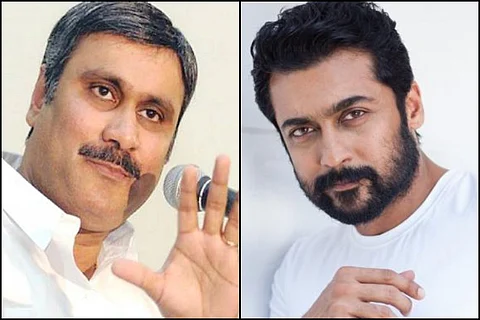

Actor Suriya has responded to the allegations by Anbumani Ramadoss of the Pattali Makkal Katchi (PMK) that the film Jai Bhim is a planned attack on the Vanniyar community. In a letter released via his Twitter account on Thursday, November 11, Suriya said that no one from the film’s team had any intention of hurting any single individual or a particular community. Rajya Sabha MP and former Union Health Minister Ramadoss had addressed a letter to Suriya earlier on November 10, posing a series of probing questions about the film. He questioned the way one of the characters, a brutal Sub-Inspector, was represented, alleging that it was an insult to Vanniyars.
Directed by TJ Gnanavel, Jai Bhim, which is based on real events, tells the story of the three men from the Irular tribe falsely framed in a theft case by police officers who are under pressure to solve pending cases. Jai Bhim shows the horrific police brutality that the Irular men are subject to, and the legal battle fought by retired Madras High Court judge K Chandru in the '90s, along with Sengani, whose husband is one among the three men who are falsely framed. A few details were, however, changed, including the name of the character Sengani, who is based on a woman named Parvathi. Ramadoss questioned Suriya on some of these changes.
Ramadoss complained that while the makers chose to retain the original names of the Irular youngster who was murdered (Rajakannu), the lawyer defending the victim in court (Chandru) and the IG who heads the inquiry in the film (Perumalsamy) — the real names of those who were involved in the actual incident — the name of the Sub-Inspector who had beaten Rajakannu to death was changed to Gurumoorthy. Ramadoss questioned why the team had done so, “despite knowing fully well” that the SI’s name was Anthonysamy. He also went on to ask why there were courtroom scenes created in the film, where the sub-inspector character was addressed as Guru.
Ramadoss also asked Suriya why in a particular scene in the film, in which the SI is shown talking on a telephone at his home, there was a Vanniyar association calendar in the background bearing the ‘Agni Kalasam’ (a pot of fire), a symbol of the Vanniyar community.
Responding to these questions, Suriya said that the film was meant to depict the real life case fought by Justice Chandru, the daily obstacles faced by idnigenous people, and how overreach by authorities can be fought using the law. “Neither I nor anyone from the film’s team had the intention of hurting any single individual or particular community. I think you yourself would be aware that we have made attempts to correct the flaws pointed out to us by others,” Suriya wrote.
மதிப்புக்குரிய மாநிலங்களவை உறுப்பினர் திரு. @draramadoss அவர்களுக்கு… #JaiBhim pic.twitter.com/tMAqiqchtf
— Suriya Sivakumar (@Suriya_offl) November 11, 2021
“I agree with your statement in your letter that no one has the right to hurt any community in the name of freedom of expression. In the same manner, I believe you will agree that freedom of expression must always be protected from attacks,” the actor further said in his letter.
Suriya further wrote that “with regard to the character that you have referred to, a journalist has said that this character’s name indicates yet another community. If we are going to make guesses like these based on the name of a character, there will be no end in sight. Name-politics is going to divert those who need to come together to fight injustice and strangle the struggle.”
Suriya also said that a feature film and a documentary are not the same and that it has clearly been stated at the beginning of Jai Bhim that the film is a story based on real life events. There is a disclaimer that the characters, names and events do not singularly refer to any individual.
“If one does not have the interests of poor people at heart, no matter who they are, when they have authority in their hands, they will behave the same way. There is no distinction in this behaviour in terms of caste, religion, language, race or community. There are examples world-over for this,” Suriya wrote. “I ask that you do not view the questions raised to those in power in the film as a form of name-politics,” he added.
He ended his letter by stating, “Respectfully, I must say that I have no need to hurt any single person for the sake of publicity. Let us work in our own ways for society’s welfare.”
(With IANS inputs)
Also read: